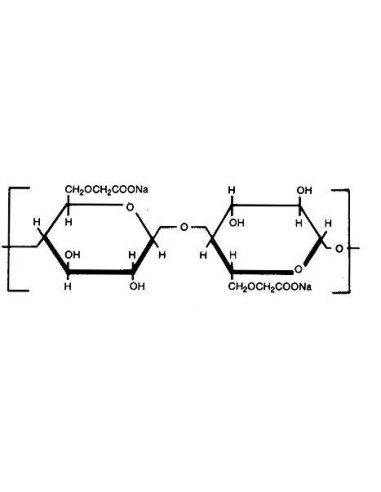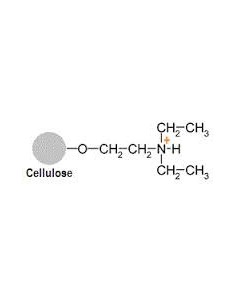CMC 52 Carboxymethyl Cellulose sodium salt
CMC 52 is a Prewetted Carboxymethyl Cellulose for Ion Exchange Chromatography of Proteins, Peptides, Nucleic acids and Saccharides
CAS # 9000-11-7
IonSep CMC 52 or Carboxymethyl Cellulose 52 is a prewetted weak cation exchange resin. Made from carboxymethyl cellulose (CMC) and preswollen for ease of use, this chromatography media is for the separation of proteins, peptides, enzymes and lipids by ion-exchange column chromatography. Our prewetted formulation provides high loading capacity and resolution with ease of use.
Specifications
- Appearance: White granular
- Granule size: 25 - 60um
- Exchange capacity (mmol/g): 1.0 +/- 0.1
- Water content %: 65 - 75
- Max flow rate (ml/min.): 50
- Column packing volume (ml/g): 6.5
- Protein capacity Lysozyme (dry, pH 5.0, mg/g): >1000
Instructions for use of Ion Exchange chromatography resins - CM52
Featured Scholarly Articles:
Genetic Engineering News, New Products, Preswollen Cellulose, August 2018 issue
The role of cathode architecture and anion interactions on the performance of Al-substituted α-Ni(OH)2 in rechargeable Ni–Zn cells - ScieneDirect
The Epichloë festucae Antifungal Protein Efe-AfpA Has Activity against Numerous Plant Pathogens - Microorganisms
Applications and advancements of Carboxymethyl cellulose click on this link.
Comparative study of flocculation and adsorption behavior of water treatment protein from Moringa peregrina and Moringa oleifera seeds
Use of IonSep CMC 52 for protein purification...
Thermodynamic profiles of the interactions of suramin, chondroitin sulfate, and pentosan polysulfate with the inhibitory domain of TIMP‐3
More on CMC 52 for ion exchange chromatography separation of proteins and nucleic acids.
CM 52 (CMC 52, Carboxymethyl cellulose) is a prewetted form of the sodium salt carboxymethyl cellulose specialized for use as a weak cation exchanger for chromatography to separate and purify proteins and nucleic acids based on their size and charge characteristics. It is composed of cellulose modified with carboxymethyl groups.
CM 52 offers excellent binding capacity and is particularly effective in size exclusion chromatography, where it separates biomolecules based on their molecular weight. The porous nature of the CMC resin allows larger molecules to flow through the column more rapidly, resulting in their earlier elution, while smaller molecules are retained and elute later.
In protein chromatography, carboxymethyl cellulose is commonly used for desalting, buffer exchange, and removal of contaminants. It efficiently separates proteins from unwanted substances such as salts, enzymes, and other impurities. Additionally, CM 52 can aid in the isolation of specific protein fractions based on their molecular size.
For nucleic acid chromatography, carboxymethyl cellulose is used to separate DNA and RNA molecules of different sizes. It facilitates the removal of small oligonucleotides, enzymes, and other contaminants from the sample. This purification step ensures high-quality nucleic acids suitable for applications like PCR, sequencing, and cloning.
CM 52 is compatible with a wide range of buffer systems and can be used under different pH and salt conditions. It is available in various particle sizes, allowing researchers to choose the appropriate resin for their specific chromatographic needs.
Overall, carboxymethyl cellulose is a versatile and reliable chromatography resin for the purification and separation of proteins and nucleic acids. Its ability to separate molecules based on size and charge properties makes it an essential tool for researchers and scientists working in molecular biology, biochemistry, and biotechnology.
TAGs cmc 52, prewetted cellulose, caroxymethyl cellulose, whatman, cmc agarose, cmc sephadex, cmc sepharose, cmc sephacel



